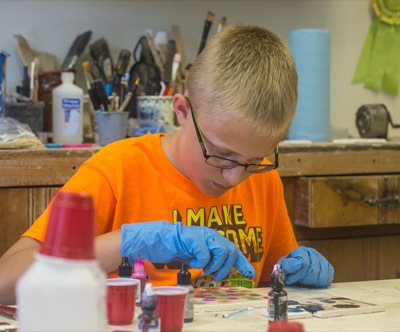Monday, August 7th, 2017
MVP Dairy officials ask for chance
Some in community unhappy about 4,500-head dairy planned near Neptune
By Sydney Albert
CELINA - Many concerned citizens and neighbors have spoken up against a proposed 4,500-head dairy operation northwest of Neptune, but dairy officials continue to ask to be given a chance.
MVP Dairy is a partnership of McCarty Dairy of Colby, Kansas, and VanTilburg Farms of Celina. Neighbors near the site of the proposed facility have expressed concerns about the odor, increased traffic, manure runoff, exhausted wells, groundwater contamination and decreased property values.
Signs have gone up in Neptune calling for the boycott of Dannon Yogurt which would buy the milk from the dairy. An online petition titled "Stop Dannon and the CAFO Farms!" has gained 66,323 supporters, 1,715 of whom are from Ohio, according to the hosting website.
Some comments on the petition mention pollution concerns. Others say keeping so many cows close together is inhumane.
McCarty Dairy has four dairy facilities in Kansas and Nebraska and manages 8,200 cows. Its smallest facility is a 1,400-head dairy, and the largest holds 2,600 head, according to Ken McCarty of the company. The MVP facility would become the family's largest affiliated dairy and be located in an area with greater population density than the land around their their western facilities.
Addressing concerns about animal treatment, McCarty told the newspaper that all his family's farms are Validus animal-welfare certified and are audited each year as required by the Dannon Pledge. He continued on to say the company's goal is not just to meet but also to exceed standards.
Validus is a certification company that audits food companies and producers to ensure food is produced using socially responsible, on-farm production practices. Validus announced in May that McCarty Farms was the first Dannon dairy to successfully complete all four audit areas: animal welfare, environmental, on-farm security and worker care.
"We're not a big corporation. We're not here just to make money. We're here to try to be good neighbors. We're here to be good stewards," McCarty said.
Joan Dingwerth runs a conference center about five miles from a McCarty facility in Rexford, Kansas, and said that she believes the dairy has been a positive influence on the town.
The workers brought in to operate the dairy have increased school attendance and funding, she said. In addition, more housing was built on the edge of town. Odor has not been a problem because the cattle are far enough away from residences.
"The McCartys themselves are good people. They run a fantastic business. It's an amazing operation," Dingwerth said.
McCarty said some houses and businesses are within a mile of the western dairy facilities, but the family had received no outstanding odor complaints. While family members now run facilities in more sparsely populated areas such as Kansas and Nebraska, they started with a farm in Sugar Run, Pennsylvania, which he compared to west-central Ohio, and said they've learned how to be good neighbors. His parents live on one of the western dairy facilities and have had no issues with hydrogen sulfide poisoning, another concern brought up by local citizens.
"Maintaining a really clean dairy facility, a really clean dairy farm, goes a long way toward keeping the odors in check, keeping the flies in check, and the way that the MVP farm is going to be designed, it's designed with that mindset," McCarty said. "The dairy's going to be designed to mitigate any sort of odor issues, to mitigate fly pressure. It's been designed to be as environmentally friendly as I think we can make it."
The McCartys also have made efforts to be environmentally conscious in Kansas, where aquifer decline is an issue, McCarty said. The evaporative milk-processing plant at the Rexford dairy was originally built to make transporting milk easier, but it also helps curb water use. They reclaim about 50,000 gallons of water a day from the plant.
All manure generated at the proposed facility would initially be applied to land controlled by MVP, McCarty noted. A little over 600 acres will be under center-pivot irrigation systems that will use the manure nutrients from an irrigation pond during the growing season, as well as any necessary slurry manure that would be needed.
In response to rumors that MVP Dairy would be allowed to spread more than the 40 ppm of manure recommended for smaller farms, Ohio Department of Agriculture Deputy Communications Director Brett Gates said the 40 ppm number is a recommendation, not a limit, based solely on expected crop response to fertilizer inputs and was not created to reduce environmental risk. A limit of 150 ppm, however, has been specifically designed to help reduce environmental risks.
Gates told the newspaper that MVP would receive no special treatment and be held to the same standards of manure application as on smaller farms.
"Our goal is to be a good neighbor, and a good member of the community. That's not a responsibility that we take lightly," McCarty said.
McCarty brought up the Yogurt for Youth program his family members had created in conjunction with Dannon. Last year, they donated roughly 250,000 servings of yogurt to schools near their facilities in areas that had experienced major cuts to healthy snack programs. Family members plan to duplicate such programs in Mercer County.
"Without the towns that we live in, what's the point of having a dairy farm there? The future of our business depends on the future of the communities where our farms are located, where we live, where our families live," he said.
Public meeting:
WHAT: Ohio Department of Agriculture open house and public meeting about MVP Dairy proposal.
WHEN: 6:30 p.m. Tuesday.
WHERE: First-floor conference room, Mercer County Central Services Building, 220 W. Livingston St., Celina.
